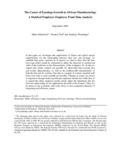The Causes of earnings growth in African manufacturing: A matched employer-employee panel data analysis
| dc.contributor.author | Wambugu, Anthony | |
| dc.contributor.author | Söderbom, Måns | |
| dc.contributor.author | Teal, Francis | |
| dc.date.accessioned | 2015-07-27T16:30:10Z | |
| dc.date.available | 2015-07-27T16:30:10Z | |
| dc.date.issued | 2003 | |
| dc.identifier.uri | http://hdl.handle.net/11295/88977 | |
| dc.description.abstract | In this paper we investigate the implications of labour and capital market imperfections for the relationship between firm size and earnings. To establish that such a question is of interest we need to show that the firm size-wage effect cannot be explained by either the observed or unobserved skills of the workforce or the characteristics of the workplace. To do that we require data where controls are possible for observable time-varying firm and worker characteristics, as well as the unobservable characteristics of both the firm and its workers. Our data is a sample of workers matched with firms over time so such controls are possible. Changes in wages are shown to respond to changes both to profits per employee and the size of the firm. It is argued that these empirical results clearly reject the hypothesis that the firm-size relationship can be explained by the skills of the workers. They can be shown to be consistent with some forms of non-competitive theories of bargaining and efficiency wages | en_US |
| dc.language.iso | en | en_US |
| dc.title | The Causes of earnings growth in African manufacturing: A matched employer-employee panel data analysis | en_US |
| dc.type | Article | en_US |
| dc.type.material | en_US | en_US |

